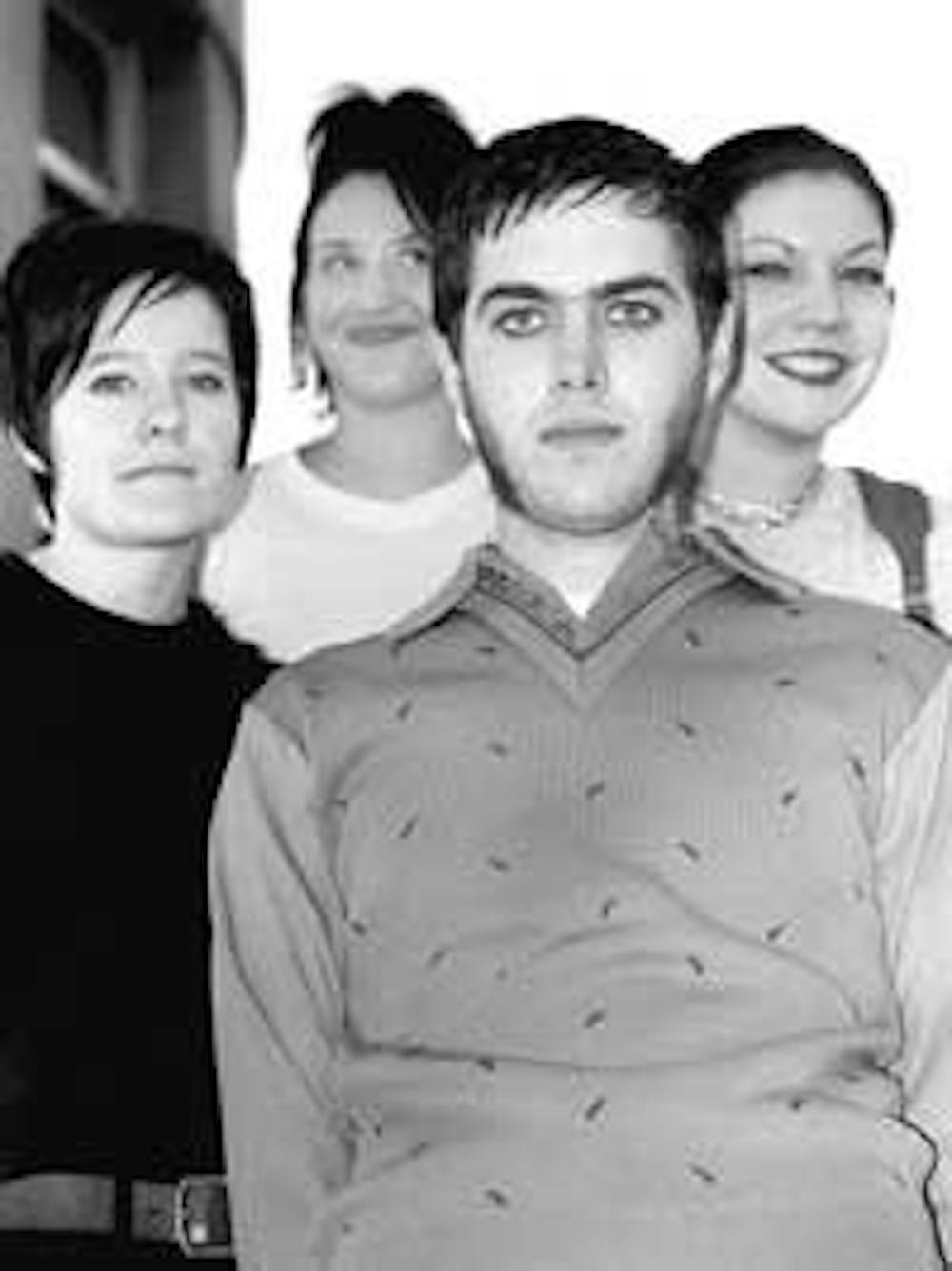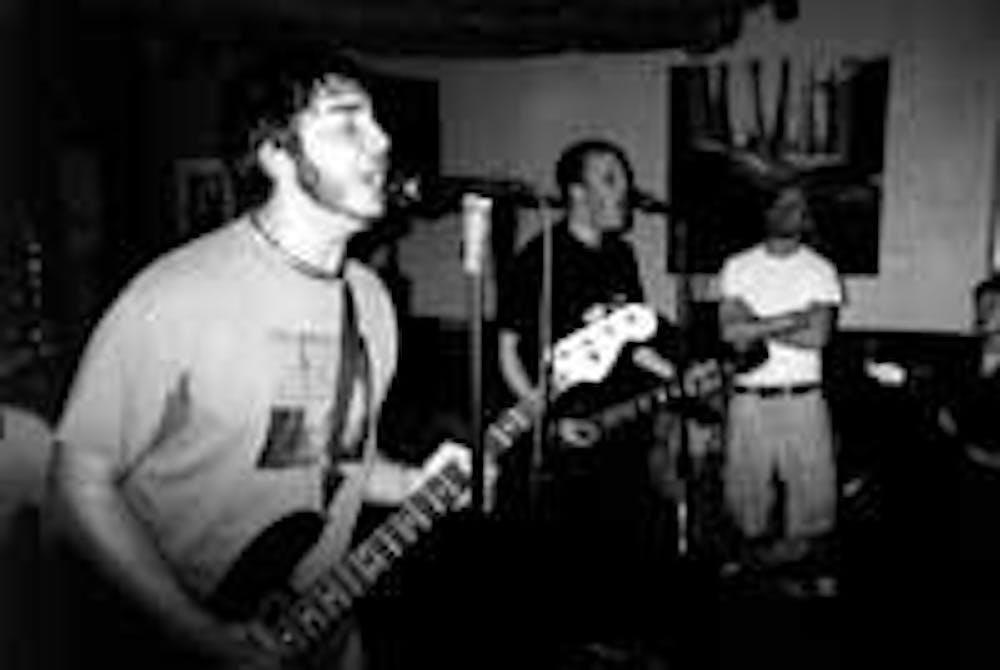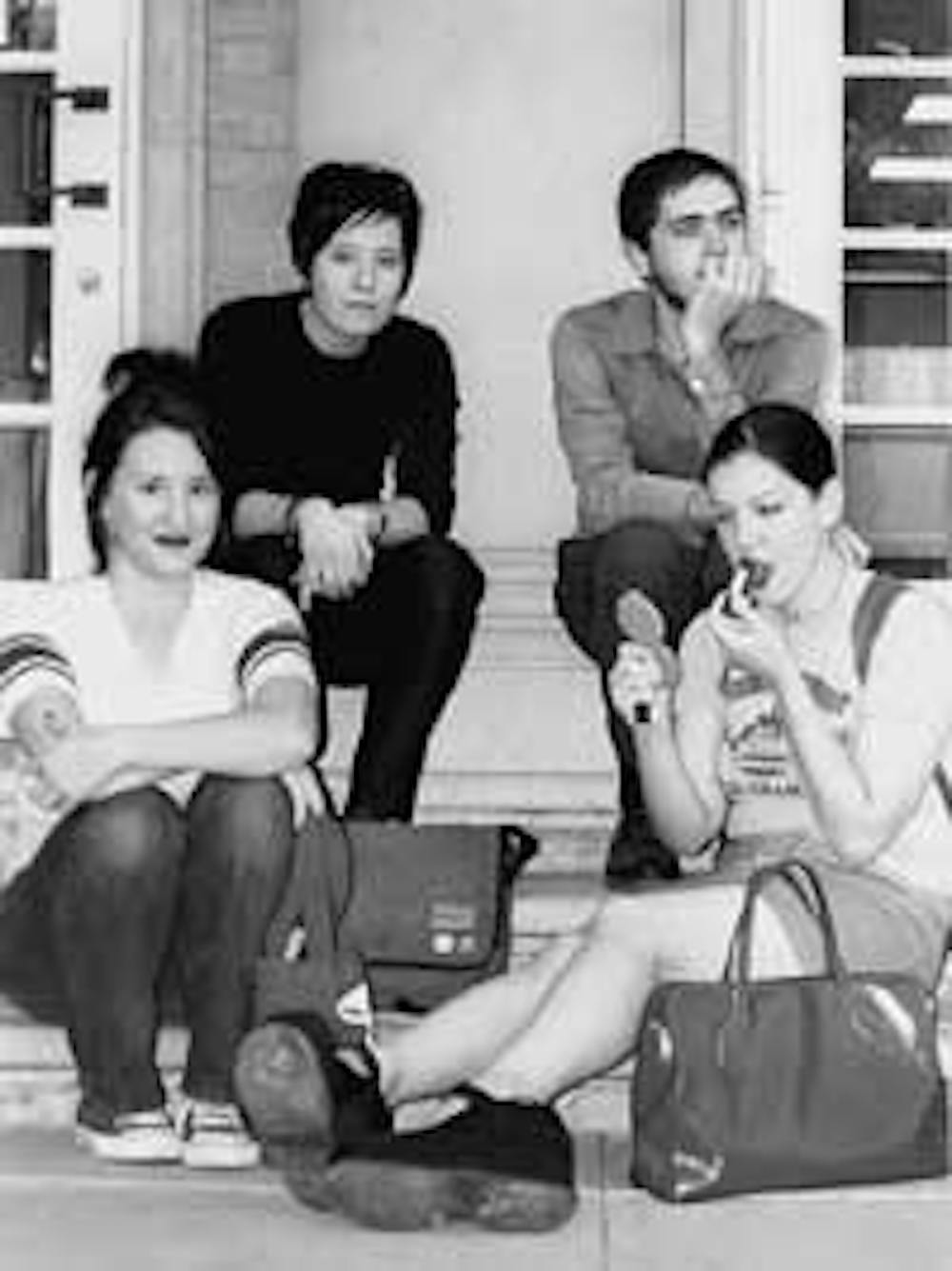David Rhodes sat in front of an ASU classroom Tuesday, his hands emerging from tailored shirt cuffs to briskly interpret the professor's words. Later that night, the same hands energetically teased an electric guitar for a crowd at the Yucca Taproom.
Rhodes signs by day and sings by night. He's one of countless local musicians who work, study and hope against hope for a big break.
"My life is dichotomous," he said. "On one hand, I spend a lot of my time with people in the deaf culture, and on the other hand I'm spending time with musicians. They are completely opposite worlds."
As a university interpreter, Rhodes attends several classes a week to decipher lectures for deaf students. He's not deaf himself, but has been intrigued by sign language from an early age. He decided to teach himself how to sign the alphabet during elementary school, mostly because he was bored with what the teacher wanted him to learn.
"I had a discipline problem and would sit in the back of the class, reading the encyclopedias," he said. "One day I was in the 'a' section and saw a hand making a fist. My knowledge of sign language started there."
It's a hard rock life
Education has always been important to Rhodes — it's an important value to his family. That's why going to college wasn't even a question for the budding musician. While many people choose music or school, Rhodes chose both.
Rhodes enjoys being a business student at ASU, but he looks forward to ripping off that collared shirt, throwing down the schoolbooks and completely letting loose at the end of the day.
"I'm not a button-up shirt kind of guy," he said in his Matthews Center office, fidgeting with the buttons on his blue tailored shirt. He looks more like a young professor than a musician. His name is even on the door.
"(Being in a band) is a pressure valve," Rhodes added. "It gives me an excuse to wear pink pants and do or say whatever the hell I want. Hell, I'd be a basket case if I didn't let it out one way or another."
But being a student and a rock musician is far from easy. His band, American Standard, formed in April and is just making headway in the Tempe music scene. It landed a weekly gig playing Tuesdays at Tempe's Yucca Taproom and tries to play other shows on the weekends. Their most recent was at Hard Rock Café in Phoenix.
In addition, the four-person pop rock band practices a couple times a week.
"Things took off in the summer, and we almost lost our footing when school started," Rhodes said. "School throws a monkey wrench or two. I've had to blow off a test to practice for a gig, and vice versa. Being a student in a band, well, it's another catalyst for an ulcer."
Rhodes said his love of learning and performing are constantly competing. Allison Wear, member of the band The Billy No Mates, can sympathize. For a year, she's juggled schoolwork as an ASU photography student and the lure of local gigs as a band member.
But next semester, the senior won't be performing with the No Mates.
"For me, a band is supposed to be fun, and for me school is a priority," Wear said. "Next semester is my last semester, so I have to buckle down. I'm moving away in a year, so I have to work a lot, too."
Joe Simek, a journalism senior at ASU, had to make a similar decision. His indie rock band, The Dying Time, recently broke up. The catalyst was Simek's impending graduation and planned move to Chicago.
Like many bands, members of The Dying Time had trouble managing school and music.
"Being in school really held us back," Simek said. "A lot of people I've known have dropped out to do it (be in a band). It takes time to practice, play shows, get your name out there. And touring is something you have to do eventually."
She works hard for her money
While being in a band is work, it's not the kind that pays the bills, which can be another burden to financially strapped students. Only big-name bands make big bucks. Most young, student bands make at worst nothing and at most $100. And that's $100 total, not per person.
"Some places give us a bar tab," Wear said. "Tucson did. They were generous. They didn't even keep track of our bar tab."
"Drink up, kids," her bandmate, Jessica Jurgens, chimed in.
The Billy No Mates, including Wear, Jurgens, Brandon Canfield and Krista Ruet, agreed that it would take a lot more than free beer to persuade them to drop school for music. It would take the guarantee of money, and lots of it.
"If I was guaranteed money, like U2-amounts of money," Wear said, "then I might consider it."
Jurgens drives a harder bargain.
"It would take guaranteed money, a decent contract and the chance to grace the cover of Rolling Stone."
Like many students, Canfield added that he sees a degree as "something to fall back on."
Simek and The Dying Time bandmates said they had to work in order to support themselves.
"The pay is horrible. It's really bad, depending on the club" Simek said. "The most we ever made was at our last show, which was $90 to split between three of us. Usually to make $30 is a good night.
"At one of the shows we played at the promoter bought me a beer, and that was our pay."
Because of the poor pay, and also because of other priorities, Simek said his band for the most part viewed performing as a hobby. But there were stars, however small, in their eyes.
"At first it was just a fun thing to do," he said. "But then we started getting responses like, 'we really like your band,' and people were showing up regularly, and you start to think that maybe this could turn into something. But then we got into the monotony of playing and not getting paid.
"You realize college is the rout to go. College is what will help you take off, unless you want to live in a van, tour non stop and play shitty clubs. I have a lot of respect for bands that stick it out and make it, but none of us wanted that lifestyle, at least not now."
Hangin tough
The pay is bad, the work is hard and the hours in the day are few. But still, student bands keep popping up around Tempe. And once they sprout, they're slow to die.
"There're a lot of bands with members who go to ASU," undeclared freshman Stephen Chilton said.
He should know. As a local promoter, Chilton is employed by clubs to seek out bands that can draw a crowd. And he often draws from the wellspring of ASU bands when booking shows. Although a lot of ASU bands are talented, they do have a daunting challenge.
"It's definitely more difficult for them, especially because almost all shows are at night, and it's kind of hard to study when you're out at night a lot," he said. "I know a few bands that have gotten big locally, and a couple members have dropped out of college."
Rhodes said he's determined to finish school. He's quick to add that while school is a hindrance in some minute ways, in the grand scheme it fuels his music.
"If you're not being stimulated, you are not stimulating," he said. "If you don't have input you don't have output. In school you are learning, and that's conducive to writing music. Otherwise you're sedate; you have to go looking for the inspiration, and it's not genuine."
And even though The Dying Time is no more, its former members are still driven to make music. Kurt Johnson, who played electric guitar for the band and is an English major, said he will always be a student of life and music.
"Our band was realistic about it, we knew what we were capable of; we did everything in our power that we could do," he said. "Now, I'll maybe try doing something a little different. I've just been writing songs, playing guitar and keeping the option (of performing again) open."
The Billy No Mates said they will likely continue performing next semester without Wear. They've learned a lot from playing regularly in Tempe, and among the most valuable of all lessons is the importance of making connections. The No Mates go to other bands' shows and have gotten to know local promoters.
"Support the scene and it'll support you," Canfield said.
Rhodes said his biggest lesson has been "the shameless art of self-promotion." As he continues his business studies, he and his band also focus on getting their name out. And Rhodes wouldn't have it any other way.
"For about seven years I've been laying in wait, waiting for the right connection and chemistry," he said. "I'm still in the trenches. It's easy to run long on dreams and short on determination, but you've got to take your licks, keep taking it on the chin, because perseverance pays off."







